If you ask people to name a Newton Heath brew, they would probably say Wilson’s, but there was another, perhaps less well-known local brewery, close to the Failsworth boundary.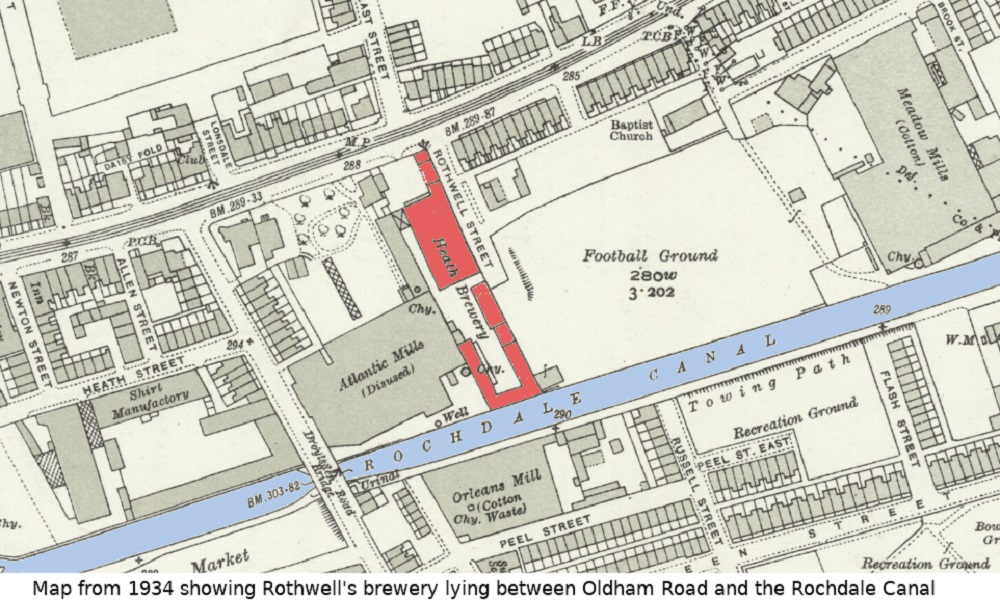 William Thomas Rothwell was born at the curiously named Spout Bank in Heap, near Bury, in 1844, the son of farmer John and his wife Martha. It seems William did not wish to follow his father into farming, because by 1870 he is listed as secretary of the Bury Brewery Company, founded in 1861 on George Street. The 1871 Census gives his occupation as ‘innkeeper and brewer’ living at 96 Georgiana Street, round the corner from the brewery.
William Thomas Rothwell was born at the curiously named Spout Bank in Heap, near Bury, in 1844, the son of farmer John and his wife Martha. It seems William did not wish to follow his father into farming, because by 1870 he is listed as secretary of the Bury Brewery Company, founded in 1861 on George Street. The 1871 Census gives his occupation as ‘innkeeper and brewer’ living at 96 Georgiana Street, round the corner from the brewery.
A couple of years later, he had moved to Heath House, 800 Oldham Road, Newton Heath, at the corner of Droylsden Road, and had opened the adjacent Heath Brewery, first listed in 1873. The access road into the yard was later named Rothwell Street, as the brewery expanded.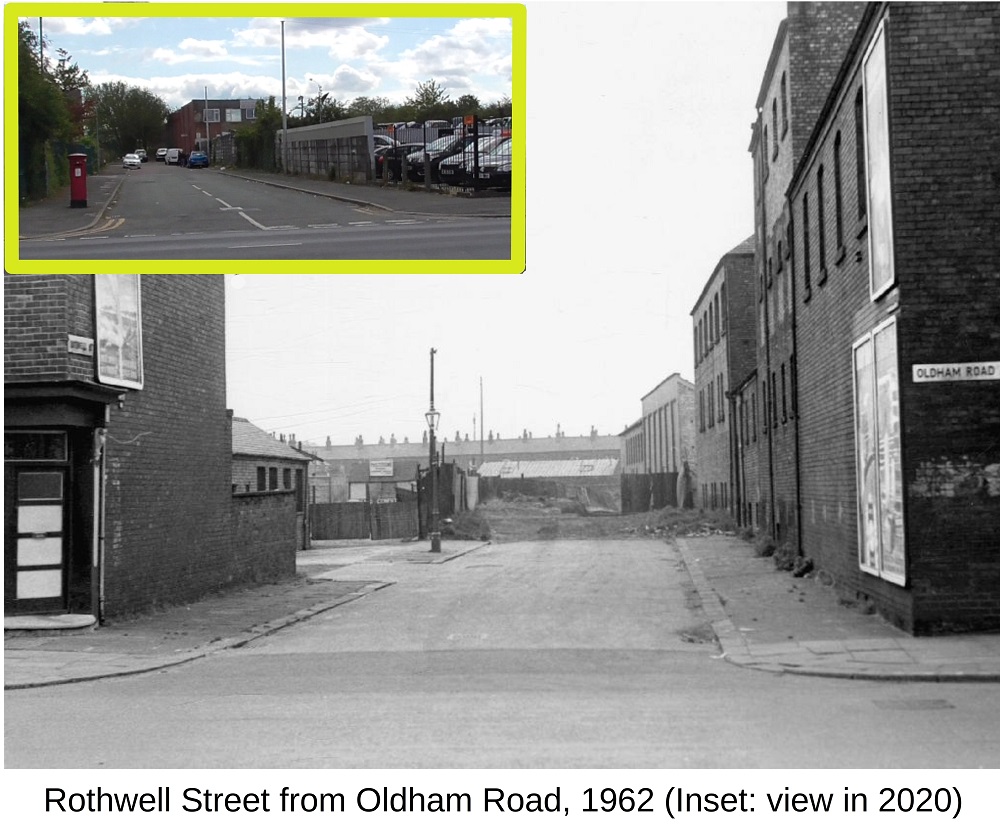 William’s brother Frederick joined him in the business, living across the road on Dob Lane, Failsworth, but suffered a fatal accident on 10 July 1886, when a wort pan boiled over, badly scalding him from the neck down. He was taken to William’s house but despite being attended by doctors, died 3 days later; he was only 33.
William’s brother Frederick joined him in the business, living across the road on Dob Lane, Failsworth, but suffered a fatal accident on 10 July 1886, when a wort pan boiled over, badly scalding him from the neck down. He was taken to William’s house but despite being attended by doctors, died 3 days later; he was only 33.
William became a Conservative councillor and alderman for Newton Ward (even years after his death the brewery and its products were known by locals as Alderman Rothwell’s). He was on the committee of the ‘Bimetallic League’ and published a booklet on the subject in 1890. This was an organisation whose aim was to create a fixed international ratio between gold and silver for currency stability.
Long a campaigner for free education and trustee of the Mechanics’ Institute, in 1891 he attended the official opening of Newton Heath library next to the town hall on Oldham Road (roughly where the Gateway is now), having contributed to its creation.
He raised funds for a scholarship in Economics at the university, and to an archaeological dig (in 1907) in Reifi, where Sir William Flinders had excavated the tombs of two Egyptian brothers, dating from around 1900-1700 B.C. They were said to be the finest non-royal burials ever found in the area and the mummies were brought to Manchester Museum in 1908.
William died in Harrogate in 1921. The brewery continued under his son, Herbert, who in the 1890s and early 1900s had also been an amateur footballer. He played full-back for Newton Heath Athletic, was captain of the Glossop North End team and later played both for Lincoln and (after 1902), Manchester United. Herbert retired from the brewery in the 1930’s and died in 1955.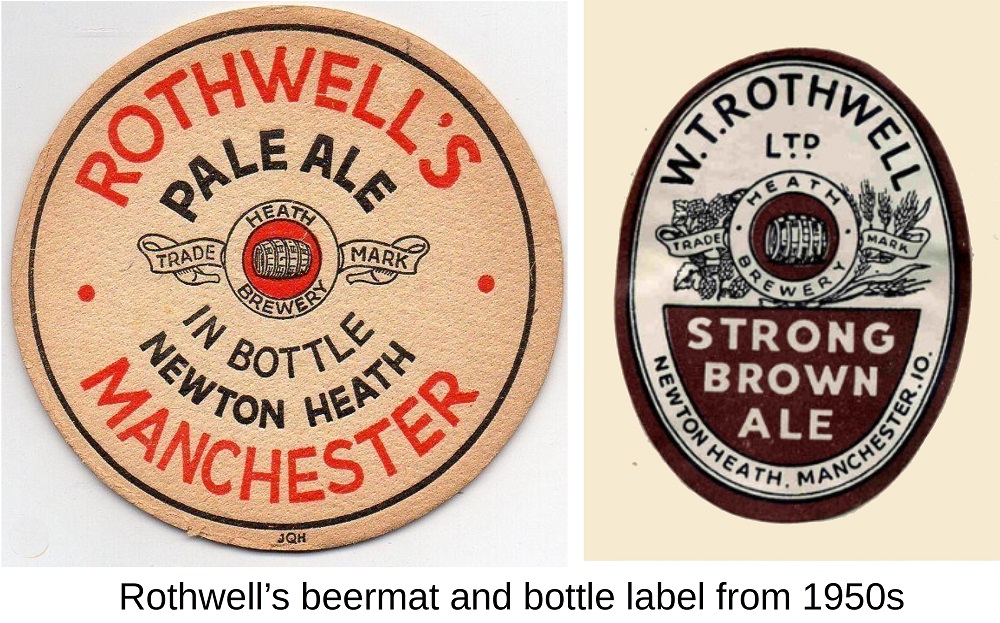 Rival brewers Wilson’s had far more tied houses than Rothwells, who had only 40 or 50; mostly around Newton Heath and Failsworth with a handful in places such as Ashton, Oldham or Stalybridge. A few of these disappeared early in the 20th century, such as the Farmyard Tavern (which it was, literally) on Ten Acres Lane, which closed in 1917. However, quite a few former Rothwells pubs have survived, although you would be forgiven for not recognising them as such.
Rival brewers Wilson’s had far more tied houses than Rothwells, who had only 40 or 50; mostly around Newton Heath and Failsworth with a handful in places such as Ashton, Oldham or Stalybridge. A few of these disappeared early in the 20th century, such as the Farmyard Tavern (which it was, literally) on Ten Acres Lane, which closed in 1917. However, quite a few former Rothwells pubs have survived, although you would be forgiven for not recognising them as such.
In 1961, the Heath Brewery was bought by Marston, Thompson and Evershed, who continued brewing Rothwell’s beers but began re-signing the pubs as Marston houses: this gave the Burton brewery its first ‘foot in the door’ in the Manchester area. Brewing ceased in 1968 and the main buildings were demolished soon afterwards, although part of the site was used as a depot for Marston’s, until the mid-1970s. Rothwell Street still exists, with a scrapyard (opened in the 1980s) now on the brewery site, but retaining a wall of one of the buildings.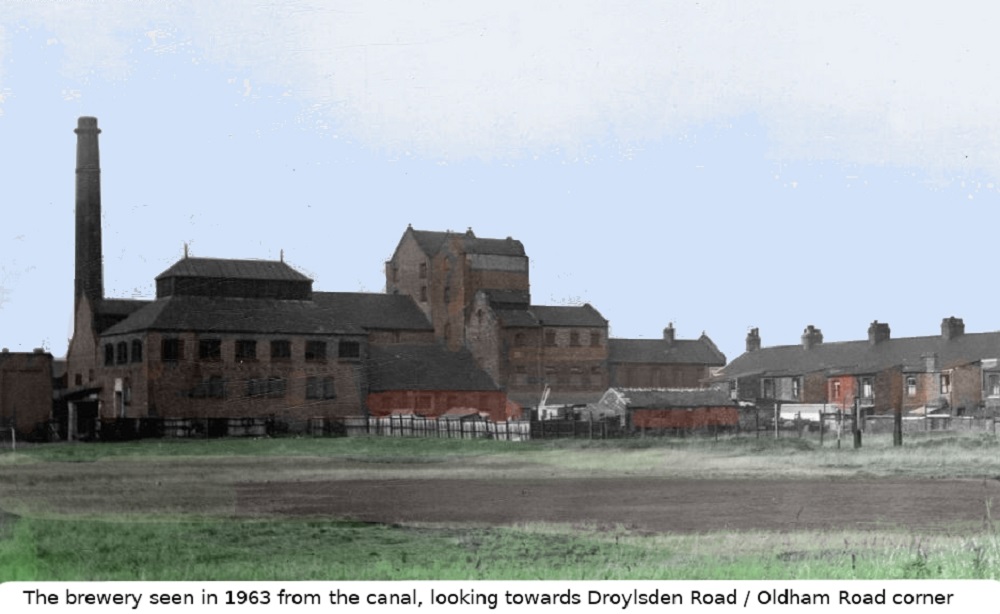 Despite the takeover, many of the pubs still sported Rothwell signage, in tilework, over doorways, or in etched glass windows, for many years. Although refurbishment has removed all traces of their previous ownership nowadays, surviving pubs include the New Crown (Newton Heath), Fox Inn (Stalybridge) and the Wheatsheaf, Pack Horse, Bay Horse, Mare & Foal, Cotton Tree and Dutch Birds (all in Failsworth).
Despite the takeover, many of the pubs still sported Rothwell signage, in tilework, over doorways, or in etched glass windows, for many years. Although refurbishment has removed all traces of their previous ownership nowadays, surviving pubs include the New Crown (Newton Heath), Fox Inn (Stalybridge) and the Wheatsheaf, Pack Horse, Bay Horse, Mare & Foal, Cotton Tree and Dutch Birds (all in Failsworth).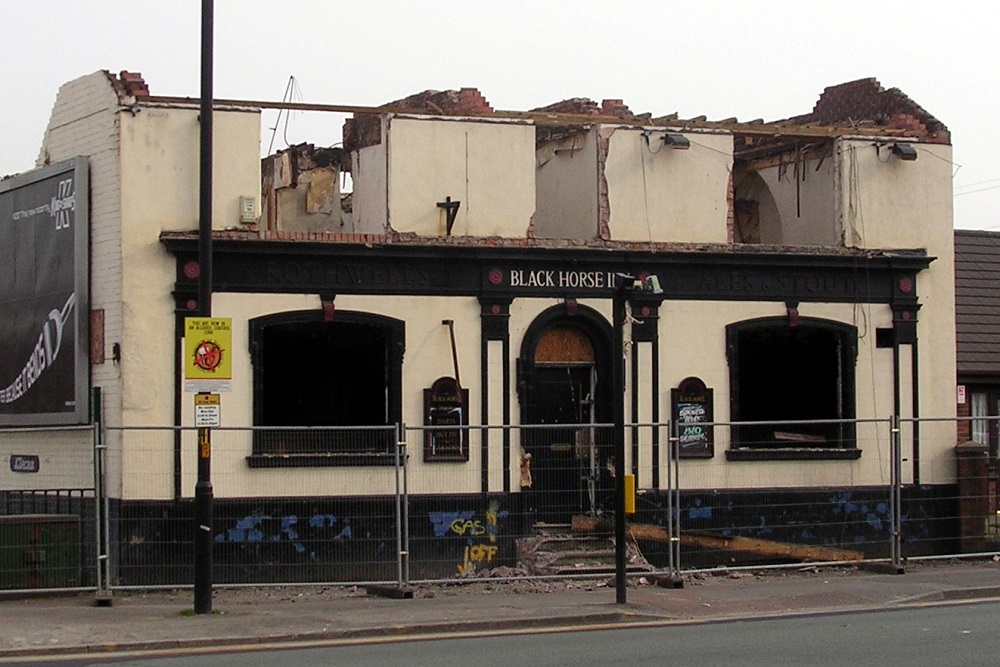 The Black Horse in 2009
The Black Horse in 2009
Most of these are now Marston’s or free houses and most have been extended or rebuilt – etched glass windows have long gone, replaced by double glazing. The last pub to retain the Rothwell signage, as far as I can ascertain, was the Black Horse on Oldham Road, Failsworth, which sadly was demolished in 2009. Though painted over in black, the ‘Rothwell’s Ales & Stout’, in tiled relief above the windows, could just be made out.
Pint of the Alderman’s Ale, anyone?